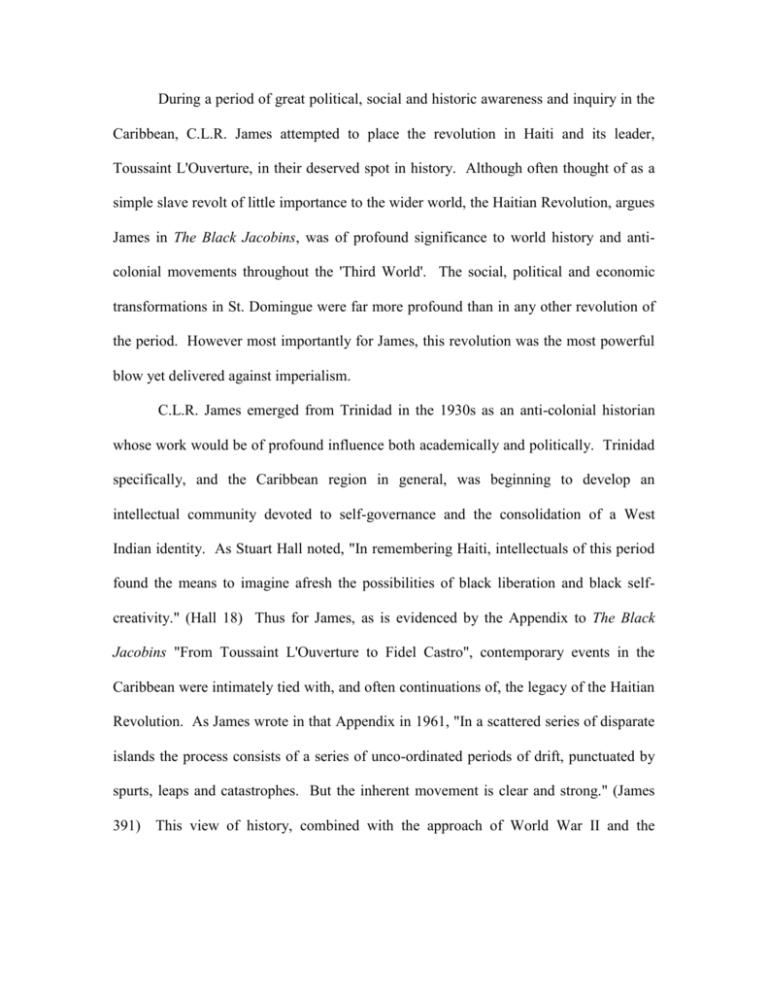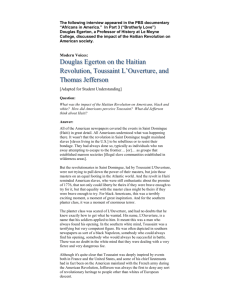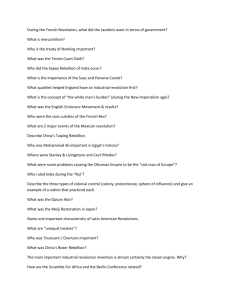Toussaint L`Ouverture and the San Domingo Revolution
advertisement

During a period of great political, social and historic awareness and inquiry in the Caribbean, C.L.R. James attempted to place the revolution in Haiti and its leader, Toussaint L'Ouverture, in their deserved spot in history. Although often thought of as a simple slave revolt of little importance to the wider world, the Haitian Revolution, argues James in The Black Jacobins, was of profound significance to world history and anticolonial movements throughout the 'Third World'. The social, political and economic transformations in St. Domingue were far more profound than in any other revolution of the period. However most importantly for James, this revolution was the most powerful blow yet delivered against imperialism. C.L.R. James emerged from Trinidad in the 1930s as an anti-colonial historian whose work would be of profound influence both academically and politically. Trinidad specifically, and the Caribbean region in general, was beginning to develop an intellectual community devoted to self-governance and the consolidation of a West Indian identity. As Stuart Hall noted, "In remembering Haiti, intellectuals of this period found the means to imagine afresh the possibilities of black liberation and black selfcreativity." (Hall 18) Thus for James, as is evidenced by the Appendix to The Black Jacobins "From Toussaint L'Ouverture to Fidel Castro", contemporary events in the Caribbean were intimately tied with, and often continuations of, the legacy of the Haitian Revolution. As James wrote in that Appendix in 1961, "In a scattered series of disparate islands the process consists of a series of unco-ordinated periods of drift, punctuated by spurts, leaps and catastrophes. But the inherent movement is clear and strong." (James 391) This view of history, combined with the approach of World War II and the entrenchment of colonialism in Africa and the Caribbean, consciously affected James' presentation of the Haitian Revolution. James saw this revolution as an integral part of the French Revolution. Indeed, for James "the history of liberty in France and slave emancipation in San Domingo is one and indivisible." (James 61) And later, he stated that "Toussaint and the blacks were… the decisive factors in the revolution." (James 145) This statement is of great importance, since the revolution to which he was referring was not the revolution of St Domingue, but of France. Thus for James, the revolution in Haiti was an arena of the French Revolution in which the most significant changes occurred. Because the enslaved people of St Domingue had such a high stake in the concepts of the revolution (liberty, equality and fraternity), they and their leaders carried these ideas further than anywhere else in the world. This age had brought political revolution to America and social revolution to France, but to St Domingue the revolution brought the complete destruction of the old order. Although Toussaint had refused to relinquish St Domingue's connection with France, in the end his comrades proclaimed, "Peace to our neighbours. But anathema to the French name. Hatred eternal to France." (from James 372) As James repeatedly asserted, "All that the labourers wanted was to be left in peace with the assurance that the whites would not seek to make them slaves again." (James 370-1) And to James, "In nothing does (Toussaint's) genius stand out so much as in refusing to trust the liberties of the blacks to the promises of French or British imperialism." (James 240) James, who was influenced by Marxism, saw the conflict in St Domingue as a class conflict as opposed to one of race. "The race question is subsidiary to the class question in politics, and to think of imperialism in terms of race is disastrous." (James 283) The imperialists used "the prejudice of race (which) is superficially the most irrational of all prejudices," in order to maintain a system of brutal exploitation that served their own interests. (James 120) "Had monarchists been white, the bourgeoisie brown, and the masses of France black, the French Revolution would have gone down in history as a race war. But although they were all white in France they fought just the same." (James 128) Thus the accomplishments of Toussaint L'Ouverture and the Haitian Revolution were the most profound strides yet made for the liberty of humankind, not just blacks or slaves. It is men such as L'Ouverture, Dessalines, and even Sonthonax, to whom, argues James, historians and revolutionary leaders should look for the revolutionary philosophy of that "pregnant age". (James 55) The actions of Toussaint and his troops "and not the perorations in the Legislative would be decisive in the struggle for freedom." (James 117) The central questions that James sought to answer in The Black Jacobins were what the revolution in Haiti represented in world history and what was its legacy for the present. As an anti-imperialist and Marxist, James naturally realized that the Haitian Revolution was central to the history of slavery, which he argued was central to the history of capitalism, and thus the history of the world. Though it would be the concern of his student Eric Williams' Capitalism and Slavery, James was less concerned about the way in which slavery and plantation agriculture initiated the capitalist economy. Rather, he attempted to show that Toussaint L'Ouverture and those who fought for freedom in St. Domingue were at the forefront, both intellectually and politically, of their revolutionary period. L'Ouverture's vision for the people of St. Domingue, "complete liberty for all, to be attained and held by their own strength", although "unaided by precedent or education", was a stinging intellectual and political catastrophe for imperialism. (James 107 & 221) In The Black Jacobins, the Haitian Revolution began a process of West Indian self-awareness, independence, and anti-imperialism that the authour was himself consciously taking part in over a century later. As Franklin Knight stated, The Haitian Revolution was "a thorough revolution that resulted in a complete metamorphosis in the social, political, intellectual, and economic life of the colony." (Knight 105) Yet for James, this in and of itself was not enough. To finish off the body of The Black Jacobins, he stated, "Finally those black Haitian labourers and the Mulattoes have given us an example to study." (James 375) The 'us' refers not to historians, but to the revolutionaries of Africa and the Caribbean who sought to escape the "prison" of colonialism. Unlike any other revolt in the Caribbean, the Haitian Revolution had eliminated slavery and colonialism. However, in The Black Jacobins, James presented a nuanced view of liberation and anti-imperialism. The genius of both L'Ouverture and Dessalines for James was their refusal to trust the freedom of their people to the promises of imperialist powers. Yet the foresight of L'Ouverture, unlike Dessalines, was that he envisioned a continued relationship with France. "Toussaint's failure was the failure of enlightenment, not of darkness." Yet Dessalines' actions, which James maintained had kept in stride with the revolution while those of L'Ouverture lagged behind, were flawed because he did not see the value in maintaining ties with France. "If Dessalines could see so clearly and simply, it was because the ties that bound this uneducated soldier to French civilisation were of the slenderest. He saw what was under his nose so well because he saw no further." (James 288) Yet for C.L.R. James and his contemporaries dedicated to the liberation of Africa and the Caribbean from colonial rule, the freedom of colonized people could never be trusted to the imperial power. In The Black Jacobins, Toussaint L'Ouverture is a tragic hero, in that "with vision, courage and determination he was laying the foundations of an independent nation", yet he could not conceive of carrying through with it. (James 23940) The difference between a revolution and amelioration of the existing situation was for James an enormous gap. To James and his contemporaries, the freedom of colonized peoples past and present could lie only in self-government, brought about and sustained by themselves. As a Marxist, James believed that this movement had to be one of the people. Despite his frequent references to the people of Haiti as "backwards", James held deep respect for 'the masses' as the catalyst of revolutionary change. Just as it had been in Haiti, he predicted, the masses of Africans who had been thrust into the forefront of the modern economy by colonialism would revolt and seek a leader with the "powerful mind" of a Toussaint L'Ouverture. (James 221) The Black Jacobins is both an authoritative historical work and a passionate political statement. In the historiography of the Haitian Revolution, it still offers the most complete and accurate account of the revolution from start to finish. Written during a period in which anti-colonial sentiment was only just beginning to be articulated in mainstream scholarship, the historical importance of the book itself lies in its use of the Haitian Revolution as a reference for anti-imperialist thought, ideology and action.







